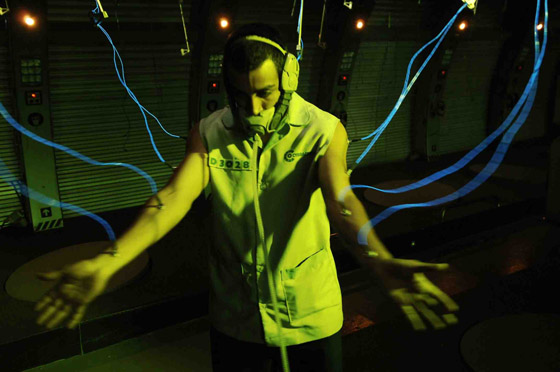The Decade in Review | Charles Mudede
The best science-fiction film of the ‘00s is Alex Rivera’s Sleep Dealer (2008)—the next great science-fiction film of that decade is Silent Light (2007). The interesting thing is that both are set in Mexico. But Silent Light is about aliens in an alien world, and Sleep Dealer is about humans in a post-human world. Rivera, a Peruvian-born digital-media artist who is currently based in NY, not only attempts to imagine the terminal point for a form of humanity that the neo-Marxist philosophers Michael Hardt and Antonio Negri designated as “the multitude” (the workers of our globalized, post-industrial moment), but it also processes science-fiction cinema in the neoliberal period—which, as David Harvey points out in A Brief History of Neoliberalism, began in the mid ‘70s and is alive and (not so) well today. Sleep Dealer is kind of a small-budget remix of big-budget space/future spectacles. The appropriators have been appropriated.
To fully appreciate Sleep Dealer’s processing/remixing/appropriation, we must open it up and, one by one, examine the films in its complicated but brilliantly built system.
Sleep Dealer begins with Star Wars (1977)—the first major science-fiction film of the neoliberal movement. Like George Lucas’ film, Sleep Dealer is about a country boy, Memo, whose family and village are destroyed by the dark forces of empire. The young man leaves the village and enters a bigger city, Tijuana, on the Mexican/American border. But whereas Luke Skywalker becomes a fighter pilot for the rebels against empire, Memo becomes a post-industrial worker for an empire that has resolved not only the problem of cheap labour but also immigration—a Mexican can work in the US without physically being in the US.
The city segment of Sleep Dealer processes three big chunks of Blade Runner (1982): urbanism in the post-national moment (no army, just policing); corporate power that’s glorified by glass towers; and the status of memory in a world that is completely commodified. Soon after settling in the city, Memo meets Luz, a woman who’s the reverse of Blade Runner’s Rachel—in Rachel’s case, it becomes more and more clear that her memories aren’t real; in Luz’s, her memories are less and less real because she sells them on the Web. And it’s not so much the selling of her memories that is diminishing their substance (or truth, or aura), but that the market forces pressure her to invent memories that are desirable, that will attract buyers.
The darkest suggestion in Blade Runner—that the corporation is manufacturing police officers—becomes the core concern in RoboCop (1987), the next film in Sleep Dealer’s system. In RoboCop, however, a tension still persists between the privatization of policing and its traditional role as a public service; in Sleep Dealer this tension has been completely resolved by the collapse of policing and military power into one function: the protection of contracts, property, and the interests of the global elite.
The least expected film in Sleep Dealer’s system is WALL*E (2008). This strangeness stems from the fact that Rivera didn’t see WALL*E, which was completed in the same year, before making his own film. Yet, the robots in both films are similar, perhaps attributable to something like Walter Benjamin’s correspondence—they are expressions of the same cultural pressures or environment. Above all, what the robots have in common is a soul—one from within, WALL*E; the other, from without, Sleep Dealer. Memo ensouls his robot, which works at a construction site in a big US city, but in the end his robot is very much like WALL*E, who works in a deserted US city. This element links the films to one of Hegel’s most celebrated assertions: only by labour, by building a human world, does the slave gain self-recognition—a soul.
The last important film in Sleep Dealer is The Matrix (1999). This film shapes its heart, and that heart is revolution. But the revolution in The Matrix is essentially empty. The humans are fighting for the right to live not as happy batteries but to live in depressing caves and to eat horrible food—meaning, they are fighting for their dignity. The revolution in Sleep Dealer is not for an idea (being human and free) but for actual resources—water, food, land. There’s lots of fantasy in Sleep Dealer, but it never loses its connection with the hard facts of life.
Charles Mudede


